
A plum is a fruit of some species in Prunus subg. Prunus. Dried plums are most often called prunes, though in the United States they may be just labeled as 'dried plums', especially during the 21st century.

In botany, a drupe is an indehiscent type of fruit in which an outer fleshy part surrounds a single shell of hardened endocarp with a seed (kernel) inside. These fruits usually develop from a single carpel, and mostly from flowers with superior ovaries.

A prune is a dried plum, most commonly from the European plum. Not all plum species or varieties can be dried into prunes. A prune is the firm-fleshed fruit (plum) of Prunus domestica varieties that have a high soluble solids content, and do not ferment during drying. Use of the term "prune" for fresh plums is obsolete except when applied to varieties of plum grown for drying.

Pollination of fruit trees is required to produce seeds with surrounding fruit. It is the process of moving pollen from the anther to the stigma, either in the same flower or in another flower. Some tree species, including many fruit trees, do not produce fruit from self-pollination, so pollinizer trees are planted in orchards.
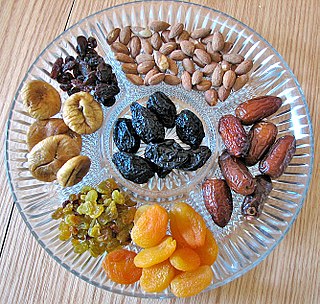
Dried fruit is fruit from which the majority of the original water content has been removed either naturally, through sun drying, or through the use of specialized dryers or dehydrators. Dried fruit has a long tradition of use dating back to the fourth millennium BC in Mesopotamia, and is prized because of its sweet taste, nutritive value, and long shelf life.

Slivovitz is a fruit spirit made from damson plums, often referred to as plum spirit. Slivovitz is produced in Central, Eastern and Southern Europe, both commercially and privately. Primary producers include Bosnia and Herzegovina, Bulgaria, Croatia, Czech Republic, Greece, Hungary, Italy, North Macedonia, Poland, Romania, Serbia, Slovakia, Slovenia, and Ukraine. In the Balkans, slivovitz is considered a kind of rakia. In Hungary it is considered a kind of pálinka, but in Romania and Moldova it is considered pălincă, similar to țuică. In Czechia, Slovakia, Galicia, and Carpathian-Ruthenia it is considered Pálenka. UNESCO put it in a UNESCO Intangible Cultural Heritage Lists in 2022 on request of the country of geographic origin Serbia.

Minute Maid is a product line of beverages, usually associated with lemonade or orange juice, but which now extends to soft drinks of different kinds, including Hi-C. Minute Maid is sold under the Cappy brand in Central Europe and under the brand "Моя Семья" in Russia and the Commonwealth of Independent States. Minute Maid was the first company to market frozen orange juice concentrate, allowing it to be distributed throughout the United States and served year-round. The Minute Maid Company is owned by The Coca-Cola Company, the world's largest marketer of fruit juices and drinks. The firm opened its headquarters in Sugar Land Town Square in Sugar Land, Texas, United States, on February 16, 2009; previously it was headquartered in the 2000 St. James Place building in Houston.

Ocean Spray Cranberries, Inc. is an American agricultural cooperative of growers of cranberries headquartered in Plymouth County, Massachusetts. It currently has over 700 member growers. The cooperative employs about 2,000 people, with sales of $1.2 billion in fiscal year 2013 and accounts for 70% of North American cranberry production. Their products include cranberry sauce, fruit juices, fruit snacks, and dried cranberries.
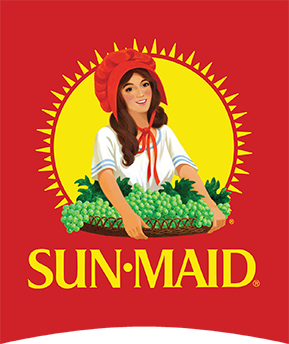
Sun-Maid Growers of California is an American farmer-owned cooperative of raisin growers headquartered in Fresno, California. Sun-Maid is one of the largest raisin and dried fruit processors in the world. As a cooperative, Sun-Maid is made up of approximately 850 family farmers who grow raisin grapes within a 100-mile (160-kilometer) radius of the processing plant. Sun-Maid also sources dried fruit beyond this geographical area.

Welch Foods Inc., commonly known as Welch's, is an American company, headquartered in Concord, Massachusetts. It has been owned by the National Grape Cooperative Association, a co-op of grape growers, since 1956. Welch's is particularly known for its grape juices, jams and jellies made from dark Concord grapes and its white Niagara grape juice. The company also manufactures and markets an array of other products, including refrigerated juices, frozen and shelf-stable concentrates, organic grape juice, fruit snacks, and dried fruit. Welch's has also licensed its name for a line of grape-flavored soft drinks since 1974. Welch's grape and strawberry soda flavors are currently licensed to Global Beverage Corporation. Other popular products that use the Welch's name are the fruit snacks made by The Promotion In Motion Companies, Inc.

Prune juice is a fruit juice derived from prunes that have been rehydrated. It is a mass-produced product that is often produced using a hot extraction method, and juice concentrate is typically produced using a low-temperature extraction method. It may be used as a dietary supplement to act as a laxative. It is also sometimes used as a flavor enhancer in tobacco products. It is an ingredient in many cocktails, such as the Purple Dragon, or Constipolitan.
Fruit brandy is a distilled beverage produced from mash, juice, wine or residues of edible fruits. The term covers a broad class of spirits produced across the world, and typically excludes beverages made from grapes, which are referred to as plain brandy or pomace brandy. Apples, pears, apricots, plums and cherries are the most commonly used fruits.

Chamoy is a variety of savory sauces and condiments in Mexican cuisine made from pickled fruit. Chamoy may range from a liquid to a paste consistency, and typically its flavor is salty, sweet, sour, and spiced with chilies.
The California Cured Fruit Association was formed by plum growers in the Santa Clara Valley, the country's largest center of production, in 1900 to handle distribution of the dried fruit. There were well over three thousand members, which included farmers in other parts of the state.
Pago is a fruit juice producer operating internationally in the fruit juice sector. The company has been producing fruit juice for more than 100 years. In the past, Pago as a member of the Brau Union Group, belongs to the Dutch Heineken Group. Heineken sold Pago to Granini Juices. In the Netherlands Pago was distributed by Pago Nederland. They lost a lawsuit with Vrumona in 2013. Vrumona is doing now distribution in the Netherlands. In 2008, Pago sold 71 million litres worldwide, equating to 260 million bottles. The Pago group employs 292 persons worldwide.

Tree Top, Inc. was the first grower-owned fruit processing cooperative in the United States. 1,100 apple and pear growers in Washington, Idaho, and Oregon own the cooperative, with the majority of the growers from Washington.
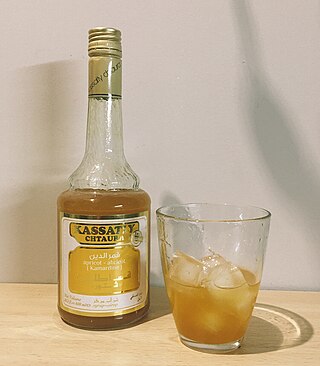
Qamar al-Din is an apricot fruit leather, which is popularly made into apricot juice or nectar beverage from Arab cuisine that is famously consumed during the Muslim holy month of Ramadan. It originates from Syria and was first produced in the Ghouta, where the variety of apricots most suitable for qamar al-din was first grown. Qamar al-din is enjoyed across the Middle East and North Africa as well as in Somalia, though Syrian qamar al-din is still believed to be the best because the variety of apricots most suitable for making qamar al-din grow only in Syria and southwestern Turkey. It is known as lavāshak in Iran and is served as a dried fruit roll.
Calavo Growers, Inc. is an international consumer goods and farm products company. The company packages, and distributes avocados and other fruits, as well as their fresh prepared food to restaurants, stores, and individual customers worldwide. While the company is based in Santa Paula, California, avocado production is cultivated throughout the state of California, as well as Central and South America. Calavo Growers was established in 1924 as an agricultural cooperative and was instrumental in launching the California avocado industry. The company operates its business through three divisions including Fresh Products, Calavo Foods and Renaissance Food Group (RFG). The company has been listed on the America's Best Small Company list by Forbes.
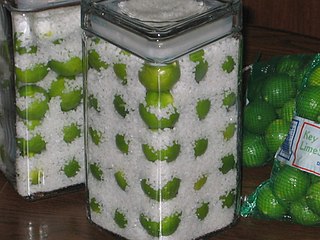
Pickled fruit refers to fruit that has been pickled. Pickling is the process of food preservation by either anaerobic fermentation in brine or immersion in vinegar. Many types of fruit are pickled. Some examples include peaches, apples, crabapples, pears, plums, grapes, currants, tomatoes and olives. Vinegar may also be prepared from fruit, such as apple cider vinegar.
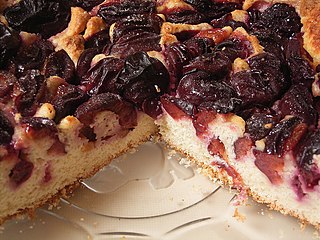
Plum cake refers to a wide range of cakes usually made with dried fruits such as currants, raisins, sultanas, or prunes, and also sometimes with fresh fruits. There is a wide range of popular plum cakes and puddings. Since the meaning of the word "plum" has changed over time, many items referred to as plum cakes and popular in England since at least the eighteenth century have now become known as fruitcake. The English variety of plum cake also exists on the European mainland, but may vary in ingredients and consistency. British colonists and missionaries brought the dried fruit variety of cake with them, for example, in British India where it was served around the time of the Christmas holiday season. In America's Thirteen Colonies, where it became associated with elections, one version came to be called "election cake".
















